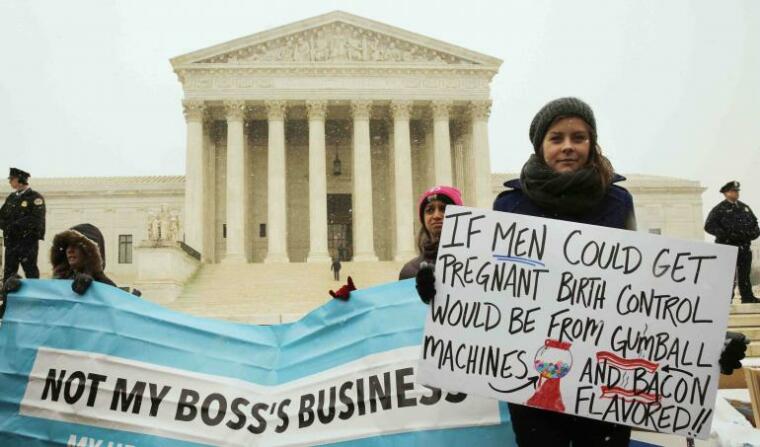Obamacare Contraception Ruling News 2015: Supreme Court Rejects Lower Court Verdict Favoring Obamacare Contraception Ruling

The U.S. Supreme Court threw out a lower court decision favoring President Barack Obama's administration's healthcare law, known as Obamacare, as it resuscitated religious objections by Catholic groups in Michigan and Tennessee to the Obamacare requirement for contraception coverage.
In a ruling issued on Monday, the Supreme Court asked the Cincinnati-based 6th U.S. Circuit Court of Appeals to reconsider its decision that supported the Obama administration in light of its earlier ruling in June 2014 allowing certain privately owned corporations to seek exemptions from the provision.
Obamacare requires employers to provide health insurance policies that cover preventive services for women including access to contraception and sterilization.
Various groups opposed to abortion and the use of contraceptives say the requirement goes against their religious beliefs.
In June 2014, the Supreme Court rejected an appeals court ruling that favored Obamacare, saying that family-owned Hobby Lobby Stores Ltd could seek exemptions on religious grounds from the contraception provision of the 2010 healthcare law.
Earlier in March, the court followed the same course of action in a case involving the University of Notre Dame.
The appeals court rulings in both cases pre-dated the Supreme Court's June 2014 ruling.
In its ruling on Monday, the Supreme Court also granted the motion by the Association of American Physicians and Surgeons to file an "amicus curiae" with the court. Amicus curiae is a legal Latin term which literally means friend of the court. As defined in legal dictionary, when a court allows for an amicus curiae, "a person with strong interest in or views on the subject matter of an action, but not a party to the action, may petition the court for permission to file a brief, ostensibly on behalf of a party but actually to suggest a rationale consistent with its own views. Such amicus curiae briefs are commonly filed in appeals concerning matters of a broad public interest; e.g., civil rights cases."
The case tackled by the Supreme Court stemmed from the lawsuit filed by religious groups including the Michigan Catholic Conference and the Catholic Diocese of Nashville with district courts in 2013. The groups opposed the Obamacare contraceptive requirement, saying that it violated the Religious Freedom Restoration Act (RFRA) although they were entitled to exemptions.
They said the provision also violated free speech, free exercise, and establishment clauses of the First Amendment; and the Administrative Procedure Act.
They eventually lost the cases, prompting them to file an appeal with the Sixth Circuit.
In a ruling last June, the appeals court said, "Because these appellants may obtain the accommodation from the contraceptive coverage requirement without providing, paying for, and/or facilitating access to contraception, the contraceptive-coverage requirement does not impose a substantial burden on these appellants' exercise of religion."
"Therefore, these appellants have not demonstrated a strong likelihood of success on the merits of their RFRA claim," the court said.
 Christians don't have to affirm transgenderism, but they can’t express that view at work: tribunal
Christians don't have to affirm transgenderism, but they can’t express that view at work: tribunal Archaeology discovery: Medieval Christian prayer beads found on Holy Island
Archaeology discovery: Medieval Christian prayer beads found on Holy Island Presbyterian Church in America votes to leave National Association of Evangelicals
Presbyterian Church in America votes to leave National Association of Evangelicals Over 50 killed in 'vile and satanic' attack at Nigerian church on Pentecost Sunday
Over 50 killed in 'vile and satanic' attack at Nigerian church on Pentecost Sunday Ukrainian Orthodox Church severs ties with Moscow over Patriarch Kirill's support for Putin's war
Ukrainian Orthodox Church severs ties with Moscow over Patriarch Kirill's support for Putin's war Islamic State kills 20 Nigerian Christians as revenge for US airstrike
Islamic State kills 20 Nigerian Christians as revenge for US airstrike Man who served 33 years in prison for murder leads inmates to Christ
Man who served 33 years in prison for murder leads inmates to Christ


 Nigerian student beaten to death, body burned over ‘blasphemous’ WhatsApp message
Nigerian student beaten to death, body burned over ‘blasphemous’ WhatsApp message 'A new low': World reacts after Hong Kong arrests 90-year-old Cardinal Joseph Zen
'A new low': World reacts after Hong Kong arrests 90-year-old Cardinal Joseph Zen Iran sentences Christian man to 10 years in prison for hosting house church worship gathering
Iran sentences Christian man to 10 years in prison for hosting house church worship gathering French Guyana: Pastor shot dead, church set on fire after meeting delegation of Evangelicals
French Guyana: Pastor shot dead, church set on fire after meeting delegation of Evangelicals ‘Talking Jesus’ report finds only 6% of UK adults identify as practicing Christians
‘Talking Jesus’ report finds only 6% of UK adults identify as practicing Christians Mission Eurasia ministry center blown up in Ukraine, hundreds of Bibles destroyed: 'God will provide'
Mission Eurasia ministry center blown up in Ukraine, hundreds of Bibles destroyed: 'God will provide' Church holds service for first time after ISIS desecrated it 8 years ago
Church holds service for first time after ISIS desecrated it 8 years ago Burger King apologizes for 'offensive campaign' using Jesus' words at the Last Supper
Burger King apologizes for 'offensive campaign' using Jesus' words at the Last Supper Uganda: Muslims abduct teacher, burn him inside mosque for praying in Christ’s name
Uganda: Muslims abduct teacher, burn him inside mosque for praying in Christ’s name